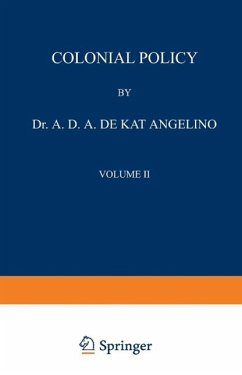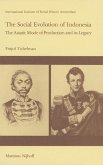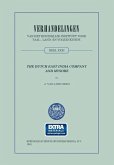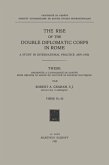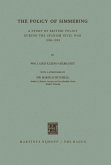A. D. A. Kat AngelinoVolume II The Dutch East Indies
Colonial Policy (eBook, PDF)
Volume II The Dutch East Indies
Redaktion: Renier, Gustaaf Johannes
40,95 €
40,95 €
inkl. MwSt.
Sofort per Download lieferbar

20 °P sammeln
40,95 €
Als Download kaufen

40,95 €
inkl. MwSt.
Sofort per Download lieferbar

20 °P sammeln
Jetzt verschenken
Alle Infos zum eBook verschenken
40,95 €
inkl. MwSt.
Sofort per Download lieferbar
Alle Infos zum eBook verschenken

20 °P sammeln
A. D. A. Kat AngelinoVolume II The Dutch East Indies
Colonial Policy (eBook, PDF)
Volume II The Dutch East Indies
Redaktion: Renier, Gustaaf Johannes
- Format: PDF
- Merkliste
- Auf die Merkliste
- Bewerten Bewerten
- Teilen
- Produkt teilen
- Produkterinnerung
- Produkterinnerung

Bitte loggen Sie sich zunächst in Ihr Kundenkonto ein oder registrieren Sie sich bei
bücher.de, um das eBook-Abo tolino select nutzen zu können.
Hier können Sie sich einloggen
Hier können Sie sich einloggen
Sie sind bereits eingeloggt. Klicken Sie auf 2. tolino select Abo, um fortzufahren.

Bitte loggen Sie sich zunächst in Ihr Kundenkonto ein oder registrieren Sie sich bei bücher.de, um das eBook-Abo tolino select nutzen zu können.
Zur Zeit liegt uns keine Inhaltsangabe vor.
- Geräte: PC
- ohne Kopierschutz
- eBook Hilfe
- Größe: 71.51MB
Andere Kunden interessierten sich auch für
![The Social Evolution of Indonesia (eBook, PDF) The Social Evolution of Indonesia (eBook, PDF)]() F. TichelmanThe Social Evolution of Indonesia (eBook, PDF)40,95 €
F. TichelmanThe Social Evolution of Indonesia (eBook, PDF)40,95 €![The Dutch East India Company and Mysore, 1762-1790 (eBook, PDF) The Dutch East India Company and Mysore, 1762-1790 (eBook, PDF)]() Jan van LohuizenThe Dutch East India Company and Mysore, 1762-1790 (eBook, PDF)40,95 €
Jan van LohuizenThe Dutch East India Company and Mysore, 1762-1790 (eBook, PDF)40,95 €![The Roman Question and the Powers, 1848-1865 (eBook, PDF) The Roman Question and the Powers, 1848-1865 (eBook, PDF)]() Ivan ScottThe Roman Question and the Powers, 1848-1865 (eBook, PDF)40,95 €
Ivan ScottThe Roman Question and the Powers, 1848-1865 (eBook, PDF)40,95 €![Profit and Power (eBook, PDF) Profit and Power (eBook, PDF)]() Charles WilsonProfit and Power (eBook, PDF)40,95 €
Charles WilsonProfit and Power (eBook, PDF)40,95 €![Colonial Cities (eBook, PDF) Colonial Cities (eBook, PDF)]() Colonial Cities (eBook, PDF)113,95 €
Colonial Cities (eBook, PDF)113,95 €![The Rise of the Double Diplomatic Corps in Rome (eBook, PDF) The Rise of the Double Diplomatic Corps in Rome (eBook, PDF)]() Robert A. GrahamThe Rise of the Double Diplomatic Corps in Rome (eBook, PDF)73,95 €
Robert A. GrahamThe Rise of the Double Diplomatic Corps in Rome (eBook, PDF)73,95 €![The Policy of Simmering (eBook, PDF) The Policy of Simmering (eBook, PDF)]() W. Laird Kleine-AhlbrandtThe Policy of Simmering (eBook, PDF)40,95 €
W. Laird Kleine-AhlbrandtThe Policy of Simmering (eBook, PDF)40,95 €-
-
-
Zur Zeit liegt uns keine Inhaltsangabe vor.
Dieser Download kann aus rechtlichen Gründen nur mit Rechnungsadresse in A, B, BG, CY, CZ, D, DK, EW, E, FIN, F, GR, HR, H, IRL, I, LT, L, LR, M, NL, PL, P, R, S, SLO, SK ausgeliefert werden.
Produktdetails
- Produktdetails
- Verlag: Springer Netherlands
- Seitenzahl: 674
- Erscheinungstermin: 6. Dezember 2012
- Englisch
- ISBN-13: 9789401189040
- Artikelnr.: 44184576
- Verlag: Springer Netherlands
- Seitenzahl: 674
- Erscheinungstermin: 6. Dezember 2012
- Englisch
- ISBN-13: 9789401189040
- Artikelnr.: 44184576
- Herstellerkennzeichnung Die Herstellerinformationen sind derzeit nicht verfügbar.
I: The Administrative System.- The East India Company.- The Period of Daendels.- The British Interregnum.- The Restoration of Dutch Authority.- The Gradual Organisation of Administration in Java.- The Development of the Central Organisation of Government after 1816.- Development of the Regional Administrative Organisation in Java since 1870.- The Controller and Indirect Rule.- The Regent.- Dutch Administration in the other Islands.- The Indonesian States.- District Administration in annexed Territories.- Conclusion.- II: The Administration of Justice.- The Separation of Powers.- Division of Administration and of Justice.- The Judicial Organisation in Java.- The Judicial Organisation outside Java.- The Law and the Principle of Dualism.- Western Law and Adat Law.- Unification and Differentiation of Law.- Administration of Justice in the Indonesianverning States.- Indonesian Jurisdiction left to the Population in annexed Territories.- III: Education.- Education as a Social Force.- Mohammedan Popular and Extension Education.- The growing demand for General Formative Education.- The First Organisation of Education.- Education of Indonesians in Town and Country.- The Dutch Indigenous School and the Problem of Westernisation.- Improvement of Government Elementary Education for Indonesians.- Popular Education in the Village.- The Link between Country and Town Education.- Education for Indonesian Girls.- Future Development of Popular Education.- The Link between Indigenous Elementary and Western Education.- Training Colleges.- Elementary Vocational Education.- Agricultural Education.- Western Education for Indonesians.- Private Education.- The Board of Education.- IV: The Construction of Society.- Society and the State.- The Great Contrast and its Solution.- State Organisation in the Colonial World.- The Western Structure of Unity and Indonesian Society.- Traffic and Indonesian Society.- The Influence of Foreign Groups upon the Indonesian Population.- East Indian and Indonesian Society.- The Dutch Nation and East Indian Society.- Education and Preparation.- Welfare Policy and Welfare Research.- Enquiries into Prosperity as a Basis for a Welfare Policy.- Statistics and Welfare Policy.- Education, Irrigation, and Emigration.- Government Pawnshops and the Fight against Usury.- The Fight against Opium and the System of a Government Monopoly.- Constructive Welfare Policy; the Popular Credit System.- Popular Credit and the Village Banks.- Criticism of the Popular Credit System.- The Development of the Co-operative Movement.- Public Health.- The Fight against Social Evils.- Child Marriage.- Religion and Marriage.- Popular Reading.- Art and Industrial Art.- The Protection of Monuments.- Agricultural Information and Improvement.- V: Political Construction.- The Idea of Unity and Self Renovation.- The Administrative Corps in the Frame of Unity.- Administration and Self-Exertion.- The Administrative Corps and Autonomous Development.- Administrative Re-organisation.- The Decentralisation of 1903.- A New Direction of Administrative Re-organisation.- The Decentralisation of 1903 and the Political Construction of 1922.- The Tendency of the Government Proposals of 1922.- The Political Contents of the Administrative Reform.- The Execution of the Administrative Reform.- The Regency.- The Province.- The Indigenous Commune.- The Council of the People.- Internal Affairs.- The Imperial Connection.- The Freedom of the Press.- The Right to Associate and to Meet.- Conclusion.- VI: The Agrarian Policy.- World Economy and Indonesian Production.- The Doctrine of State Ownership of the Land.- Authority and the Ownership of the Soil in the East.- The Influence of the Land Tax and of the Cultivation System.- Ground Rent and Contracts for Delivery.- The Cultivation System or Big Agricultural Industries.- The Twofold Aim of Agrarian Legislation.- The Indigenous Right to the Soil and its Mystico-Magical Basis.- First Steps of Agrarian Legislation.- Declarations of
I: The Administrative System.- The East India Company.- The Period of Daendels.- The British Interregnum.- The Restoration of Dutch Authority.- The Gradual Organisation of Administration in Java.- The Development of the Central Organisation of Government after 1816.- Development of the Regional Administrative Organisation in Java since 1870.- The Controller and Indirect Rule.- The Regent.- Dutch Administration in the other Islands.- The Indonesian States.- District Administration in annexed Territories.- Conclusion.- II: The Administration of Justice.- The Separation of Powers.- Division of Administration and of Justice.- The Judicial Organisation in Java.- The Judicial Organisation outside Java.- The Law and the Principle of Dualism.- Western Law and Adat Law.- Unification and Differentiation of Law.- Administration of Justice in the Indonesianverning States.- Indonesian Jurisdiction left to the Population in annexed Territories.- III: Education.- Education as a Social Force.- Mohammedan Popular and Extension Education.- The growing demand for General Formative Education.- The First Organisation of Education.- Education of Indonesians in Town and Country.- The Dutch Indigenous School and the Problem of Westernisation.- Improvement of Government Elementary Education for Indonesians.- Popular Education in the Village.- The Link between Country and Town Education.- Education for Indonesian Girls.- Future Development of Popular Education.- The Link between Indigenous Elementary and Western Education.- Training Colleges.- Elementary Vocational Education.- Agricultural Education.- Western Education for Indonesians.- Private Education.- The Board of Education.- IV: The Construction of Society.- Society and the State.- The Great Contrast and its Solution.- State Organisation in the Colonial World.- The Western Structure of Unity and Indonesian Society.- Traffic and Indonesian Society.- The Influence of Foreign Groups upon the Indonesian Population.- East Indian and Indonesian Society.- The Dutch Nation and East Indian Society.- Education and Preparation.- Welfare Policy and Welfare Research.- Enquiries into Prosperity as a Basis for a Welfare Policy.- Statistics and Welfare Policy.- Education, Irrigation, and Emigration.- Government Pawnshops and the Fight against Usury.- The Fight against Opium and the System of a Government Monopoly.- Constructive Welfare Policy; the Popular Credit System.- Popular Credit and the Village Banks.- Criticism of the Popular Credit System.- The Development of the Co-operative Movement.- Public Health.- The Fight against Social Evils.- Child Marriage.- Religion and Marriage.- Popular Reading.- Art and Industrial Art.- The Protection of Monuments.- Agricultural Information and Improvement.- V: Political Construction.- The Idea of Unity and Self Renovation.- The Administrative Corps in the Frame of Unity.- Administration and Self-Exertion.- The Administrative Corps and Autonomous Development.- Administrative Re-organisation.- The Decentralisation of 1903.- A New Direction of Administrative Re-organisation.- The Decentralisation of 1903 and the Political Construction of 1922.- The Tendency of the Government Proposals of 1922.- The Political Contents of the Administrative Reform.- The Execution of the Administrative Reform.- The Regency.- The Province.- The Indigenous Commune.- The Council of the People.- Internal Affairs.- The Imperial Connection.- The Freedom of the Press.- The Right to Associate and to Meet.- Conclusion.- VI: The Agrarian Policy.- World Economy and Indonesian Production.- The Doctrine of State Ownership of the Land.- Authority and the Ownership of the Soil in the East.- The Influence of the Land Tax and of the Cultivation System.- Ground Rent and Contracts for Delivery.- The Cultivation System or Big Agricultural Industries.- The Twofold Aim of Agrarian Legislation.- The Indigenous Right to the Soil and its Mystico-Magical Basis.- First Steps of Agrarian Legislation.- Declarations of
